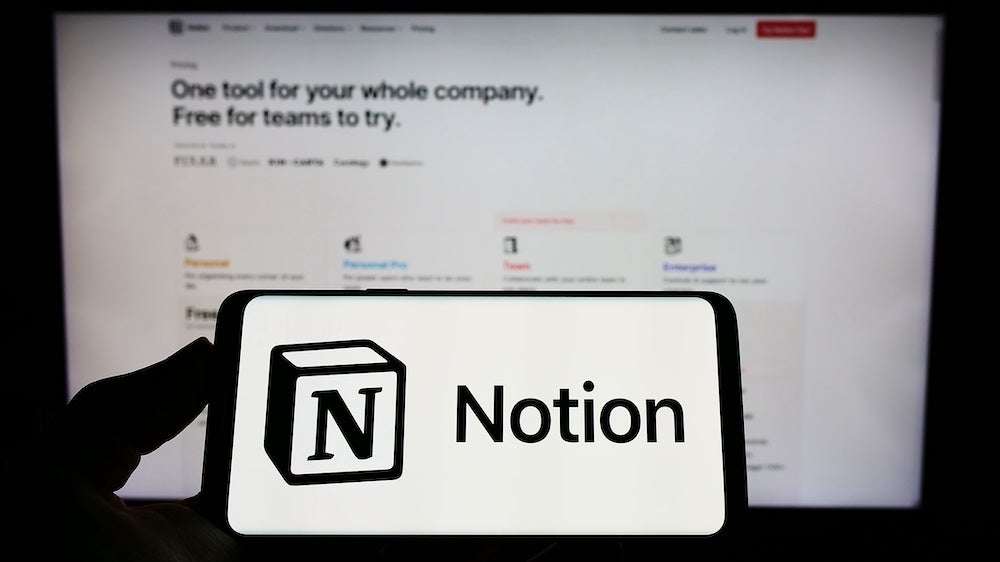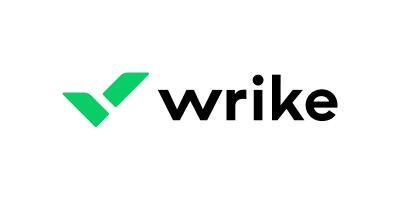-
Coda: Best for document management
-
Taskade: Best for real-time team collaboration
-
ProofHub: Best for project scheduling and planning
-
ClickUp: Best for small teams and freelancers
-
Airtable: Best for customization
-
Trello: Best free plan
-
Hive: Best for analytics
-
Asana: Best for scalability
Notion was designed as a note-taking app, but over time has evolved into powerful project management software. While Notion offers several advantages, such as its flexibility, customization and specialized note-taking capabilities, it is not for everyone. In this article, we share the top Notion competitors and alternatives for 2023, including a quick comparison table and the pros, cons, pricing and features of each project management application on our list.
Jump to:
- Top Notion competitors and alternatives: Comparison table
- Top Notion competitors
- Is Notion worth it?
- Notion pros and cons
- Do you need an alternative to Notion?
- Methodology
Top Notion competitors and alternatives: Comparison table
The following table gives an overview of how each of the Notion alternatives on our list compares in terms of their core features:
| Built-in messaging | Native time tracking | Gantt charts | Workflow automation | Starting price | |
|---|---|---|---|---|---|
| Coda | No | Yes | Yes | Yes | $10 per user per month |
| Taskade | Yes | No | No | Yes | $4 per user per month |
| ProofHub | Yes | Yes | Yes | Yes | $45 per month (flat fee) |
| ClickUp | Yes | Yes | Yes | Yes | $5 per user per month |
| Airtable | No | No | Yes | Yes | $10 per user per month |
| Trello | Yes | No | No | No | $5 per user per month |
| Hive | Yes | Yes | Yes | Yes | $12 per user per month |
| Asana | Yes | Yes | Yes | Yes | $10.99 per user per month |
Featured partners
Coda: Best for document management

With its powerful database functionality, extensive range of templates and document management features, Coda is one of the top alternatives to Notion currently available. While Coda has a steep learning curve, it is a more comprehensive project management solution compared to Notion. With Coda, you get a higher level of customization to tailor the platform according to your business needs.
Features
- Document management tools with version history and user permission features.
- Access to a variety of prebuilt templates for a variety of applications.
- Formula editor with autocomplete suggestions, formula library and debugging tools.
- Workflow automation to help streamline project management processes.
Pros
- Extensive range of prebuilt templates.
- Powerful database functionality.
- Feature-rich free plan
Cons
- User interface is not intuitive.
- No desktop app.
- Lack of advanced formatting.
Pricing
- Free: No cost and unlimited users.
- Pro: $10 per user per month billed annually, or $12 per user per month billed monthly.
- Team: $30 per user per month billed annually, or $36 per user per month billed monthly.
- Enterprise: Customized
For more information, read our full Coda review.
Taskade: Best for real-time team collaboration

Taskade is a popular project management tool. It’s similar to Notion in terms of its note-taking capabilities. However, with Taskade, you get a cleaner and more minimalist interface. While Taskade might not offer the same level of customization as Notion, it excels in real-time team collaboration tools.
Features
- Built-in messaging system with video chat capability.
- Nested task lists so users can break down large or complicated projects into more manageable subtasks.
- Mind map view to visually organize and connect ideas and tasks.
- Customizable templates for a variety of use cases.
Pros
- Comprehensive knowledge base.
- Excellent collaboration tools.
- Lots of pricing plans to suit different size teams.
Cons
- Slow loading.
- No Gantt charts or time tracking.
Pricing
- Free for up to three users.
- Starter: $4 per user per month billed annually, or $8 per user billed monthly.
- Plus: $8 per user per month billed annually, or $16 per user billed monthly.
- Pro: $19 per user per month billed annually, or $39 per user billed monthly.
- Business: $49 per user per month billed annually, or $99 per user billed monthly.
- Organization: $99 per user per month billed annually, or $199 per user billed monthly.
- Enterprise: Customized.
For more information, read our full Taskade review.
ProofHub: Best for project scheduling and planning
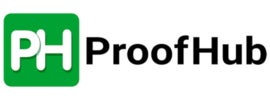
ProofHub is an all-in-one project management solution with a focus on project scheduling and planning. You get a variety of project management tools, including task management, project views, Gantt charts and time tracking. Compared to Notion, ProofHub offers a more structured approach to project management.
Features
- Collaboration tools including discussion boards, group chat and one-on-one messaging.
- Extensive proofing and review tools.
- Dashboard customization tools with a ‘quick add’ button to save favorite tools to the main dashboard. You can also easily change the interface language.
- Extensive reporting, including detailed reports on project progress and workload management.
- Advanced admin control features to protect sensitive information without restricting team productivity.
Pros
- All-in-one solution.
- Detailed project reports.
- Excellent task management tools.
Cons
- Restrictive free plan.
- Light on integrations.
Pricing
- Personal: Free with basic features.
- Essential: $45 per month billed annually, or $50 per month billed monthly.
- Ultimate Control: For the first three months, ProofHub is $89 per month billed annually, or $99 billed monthly. After that, pricing increases to $150 per month.
For more information, read our full ProofHub review.
ClickUp: Best for small teams and freelancers
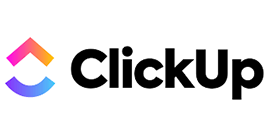
ClickUp offers a wider range of features compared to Notion, making it a more robust project management solution. It also supports more third-party integrations, although there is a steeper learning curve. With ClickUp, you get more dashboard customization, so users that only need basic tools can tailor the interface accordingly. This makes ClickUp an ideal project management platform for freelancers and small teams.
Features
- Agile support features, including sprint widgets, integration with agile applications and agile-optimized dashboards.
- Variety of project views, including mind maps, Gantt charts and kanban boards.
- Unlimited storage in higher-priced plans.
- Numerous built-in automation tools.
Pros
- Extensive agile support.
- Powerful automation engine.
- Variety of project data import options.
Cons
- Default notification settings can get overwhelming.
- Initial setup is confusing.
- Limited mobile app functionality.
Pricing
- Free: No cost with unlimited plan members.
- Unlimited: $5 per user per month billed annually, or $9 per user billed monthly.
- Business: $12 per user per month billed annually, or $19 per user billed monthly.
- Business Plus: $19 per user per month billed annually, or $29 per user billed monthly.
- Enterprise: Contact ClickUp’s sales team for pricing information.
For more information, read our full ClickUp review.
Airtable: Best for customization

Airtable is a versatile project management platform that offers a powerful combination of database functionality and a spreadsheet-style interface. Compared to Notion, Airtable offers more advanced tools and can handle a larger volume of data. The added level of complexity does come with a steeper learning curve, but it’s worth it for teams or individuals that need project management software for large or complex projects.
Features
- Custom forms that can be used to collect and feed data directly into Airtable projects.
- Interface designer to build and customize apps.
- Team collaboration tools with real-time updates to support communication.
- Link documents within Airtable for easy access and to connect various files with users or projects.
Pros
- Highly customizable.
- Visually appealing UI.
- Excellent document sharing and management tools.
Cons
- Steep learning curve, especially for users new to spreadsheets.
- Gantt charts are only available in higher-priced plans.
- Limited reporting and analytics.
Pricing
- Free: No cost with unlimited bases for up to five users, and unlimited commenter and read-only users.
- Plus: $10 per user per month billed annually, or $12 per user billed monthly.
- Pro: $20 per user per month billed annually, or $24 per user billed monthly.
- Enterprise: Contact Airtable’s sales team for pricing information.
For more information, read our full Airtable review.
Trello: Best free plan
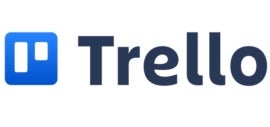
Trello is one of the most easy-to-use tools on this list, allowing for simplified project management. While Trello might not be suitable for more complex projects, it does offer an impressive range of features. The free plan offered by Trello is outstanding, as it offers a highly visual kanban board interface, along with collaboration tools and integration capabilities. If you’re looking for a free or simple alternative to Notion, Trello would be a top choice.
Features
- Variety of templates covering various use cases, including customizable and prebuilt layouts.
- Built-in automations to help minimize time spent on recurring tasks and reduce the potential for human error.
- Customizable kanban boards with drag-and-drop functionality to help simplify task management.
Pros
- Outstanding free plan.
- Simple to use.
- Robust automation features.
Cons
- Not suited for complex projects.
- Limited reporting and analytics.
- Missing more advanced project management tools, such as Gantt charts.
Pricing
- Free: No cost for unlimited cards and up to 10 boards per Workspace.
- Standard: $5 per user per month billed annually, or $6 per user billed monthly.
- Premium: $10 per user per month billed annually, or $12.50 per user billed monthly.
- Enterprise: Between $7.38 and $17.50 per user per month, depending on the number of users. Teams with more than 5,000 users can contact Atlassian for custom pricing.
For more information, read our full Trello review.
Hive: Best for analytics
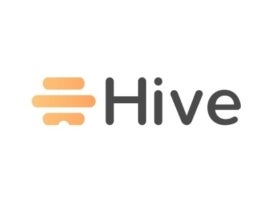
Hive and Notion share some similarities, but there are key differences between the two platforms. Most notably, Hive focuses more on reporting, analytics and team collaboration tools, making it ideal for teams that have outgrown Notion and need a solution with more powerful project management features.
Features
- Hive analytics include a variety of tools, including reports and charts for project summaries, resource management and cost tracking.
- Communication and collaborative tools, including instant messaging and group chat features.
- Time tracking tools to manage project costs, optimize resource allocation and keep projects on schedule.
Pros
- Clean and organized interface.
- Powerful analytics tools.
- Customizable dashboards.
- Visually appealing and modern UI.
Cons
- Limited user permissions.
- Extra cost for add-ons.
Pricing
- Free: No cost for up to 10 users.
- Teams: $12 per user per month billed annually, or $18 per user billed monthly.
- Enterprise: Contact Hive’s sales team for pricing information.
For more information, read our full Hive review.
Asana: Best for scalability

Asana is one of the leading project management platforms and is well known for its ability to adapt and scale according to the needs of a project. Compared to Notion, you get better project structure and organization with Asana, making it a top choice for more complex projects. However, for basic project management, you may find it unnecessarily complex.
Features
- Advanced data import and export tools allowing for easy transition to and from other project management applications.
- Detailed project views, including project calendars, timelines, task dependencies and Gantt charts.
- Variety of predefined workflows for users that need a standardized approach to project management.
Pros
- Extensive list of project templates and third-party integrations.
- Variety of data import options.
- Easy to scale.
- Team-specific workflows.
Cons
- Unintuitive UI.
- Overly complex for simple tasks.
Pricing
- Basic: No cost for unlimited tasks, projects, messages, activity logs and file storage.
- Premium: $10.99 per user per month billed annually, or $13.49 per user billed monthly.
- Business: $24.99 per user per month billed annually, or $30.49 per user billed monthly.
- Enterprise: Contact Asana’s sales team for pricing information.
For more information, read our full Asana review.
Is Notion worth it?
Notion is worth it for businesses or individuals that value a collaborative workspace and simplicity in project management. It offers a decent range of features and is highly versatile software with numerous use cases.
That said, while Notion makes it easy to organize project information in one place, for more complex projects, it may not be the best solution. To determine whether Notion is suitable for your business, you will need to assess your specific requirements against the features it has to offer.
You can learn more by reading our full Notion review.
Notion pros and cons
As with all project management applications, Notion has its strengths and weaknesses. We’ve outlined these in the following table to help you understand whether Notion aligns with your business needs.
| Pros | Cons |
|---|---|
| Specialized note-taking capabilities. | No Gantt charts. |
| Gentle learning curve. | Limited security tools. |
| Generous free plan. | Slow performance with high volume of data. |
| Highly customizable. |
Notion pricing
- Free: The free plan offers unlimited blocks for individuals, but limited blocks for teams.
- Plus: The Plus plan, formerly known as the Team plan, is priced at $8 per user per month billed annually, or $10 per user billed monthly.
- Business: The Business plan is priced at $15 per user per month billed annually, or $18 per user billed monthly.
- Enterprise: Customized pricing.
Do you need an alternative to Notion?
Whether or not you should use Notion depends on your business requirement and priorities. If you’re a freelancer, small business or startup with basic project management requirements, Notion could be an excellent choice. One of the standout features of Notion is its note-taking capabilities, so if that’s important to you, Notion offers a key advantage over other competitors on this list.
However, if you’re managing complex projects or a large project portfolio, you may need software with advanced tools, such as ProofHub or Hive. Likewise, if you need a simple project management app with an outstanding free version, consider using Trello.
Methodology
To compile our list of the best Notion competitors and alternatives, we evaluated a wide range of software, including applications that offered project management features missing in Notion. For our evaluation criteria, we looked at the software’s scalability, customer service, usability, features, pricing and other metrics. We also factored in customer reviews and ratings from reputable websites.
